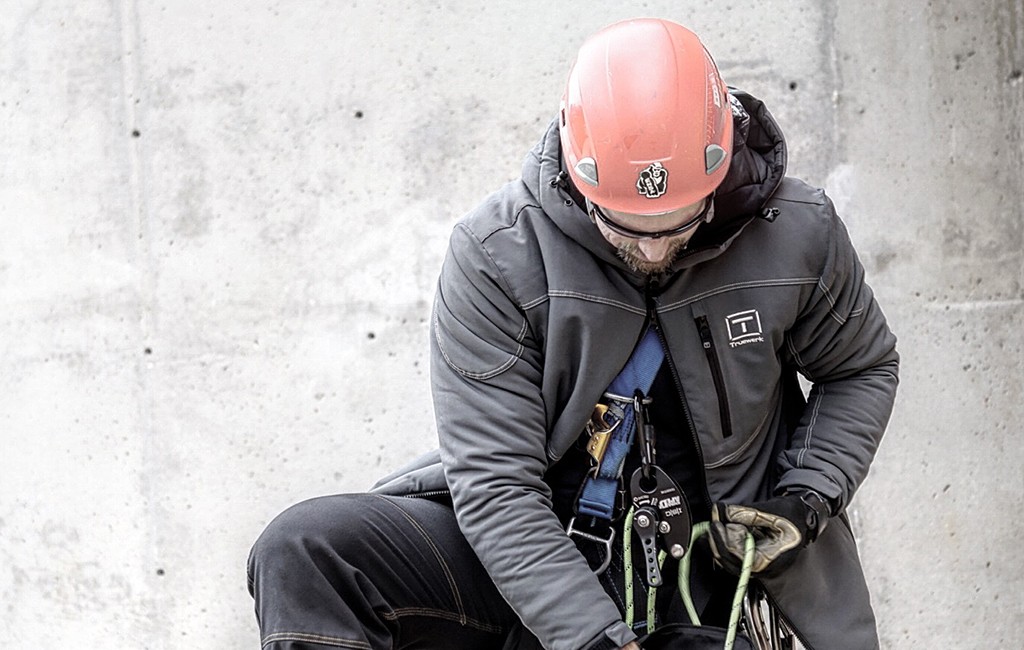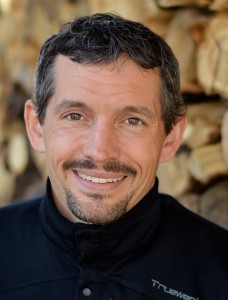
Truewerk sells pants, shirts, jackets and other apparel designed to protect from wear and weather. (Courtesy Truewerk)
Most startup founders use “sweat equity” as a figure of speech. Not Brian Ciciora.
Ciciora’s apparel startup, Truewerk, was inspired by his time working in construction, including one winter spent building houses and welding in Winter Park during the week and ski-patrolling on the weekends.
“I was using traditional cotton workwear up at the house and then going and working in the mountains in far better apparel,” said Ciciora, who studied industrial and product design at the University of Colorado Boulder and later managed production and design at outdoor gear manufacturer Backcountry Access in Boulder.
Now, less than a year after Ciciora launched Truewerk, his gear has already scaled the tent at Denver International Airport and the Grand Canyon Skywalk. And this week, it raised a $100,000 seed round.
“A lot of the money is going into inventory and working capital,” Ciciora said. Truewerk will also use the funds to sponsor events frequented by customers, like tree-climbing competitions and rope access training. “We’re out with the customers, seeing their techniques,” he said.
Investors include Dan Nordstrom, fourth generation of the family that started Nordstrom department stores, who is the CEO of Seattle-based sports gear company Outdoor Research. Another investor is Greg Hanson, the co-founder of venture capital firm Skyline Capital Partners.
Truewerk – which makes pants, jackets, hoodies, parkas, tee-shirts and baseball caps – disclosed its raise in an SEC filing Oct. 31.
Ciciora, 37, looks to fill a hole in the market that has left construction workers, arborists and other skilled laborers high and dry – which is to say, cold, wet and wearing gear that often lacks sufficient range of motion or durability.
While military and outdoor sports gear has evolved for performance, Ciciora said iconic workwear brands like Carhartt cater to hipsters rather than lumberjacks.
For example, the maintenance crew that rappels down the sides of the tent at DIA to patch leaks was working in blue jeans before it purchased Werkpants, which are designed to repel water, dry quickly and stretch for a wide range of motion.
“It’s more than comfort,” Ciciora said. “It’s a safety issue for them.”
Ciciora, who still guides occasionally and instructs avalanche safety classes, has opted to sell his gear straight to consumers after retailers gave him the cold shoulder. He said customers range from individual general contractors or rope access technicians to 100-person work crews.
Local accounts include Deneuve Construction and Taddiken Tree Company. Nationally, rope access trainers Abseilon tapped Truewerk to supply gear for cleaning the Grand Canyon Skywalk.
Ciciora also things selling direct gives him a leg up on competitors. If a product isn’t working as intended, he said, customers let him know within days. Truewerk’s only retail account is GME Supply, which specializes in gear for commercial tower-climbers and other workers.
For now, Truewerk is a one-man operation. Working out of his home office in Boulder, Ciciora hires contractors to help design products, and then has them manufactured in Southeast Asia. The business also has a warehouse in Denver.

Truewerk sells pants, shirts, jackets and other apparel designed to protect from wear and weather. (Courtesy Truewerk)
Most startup founders use “sweat equity” as a figure of speech. Not Brian Ciciora.
Ciciora’s apparel startup, Truewerk, was inspired by his time working in construction, including one winter spent building houses and welding in Winter Park during the week and ski-patrolling on the weekends.
“I was using traditional cotton workwear up at the house and then going and working in the mountains in far better apparel,” said Ciciora, who studied industrial and product design at the University of Colorado Boulder and later managed production and design at outdoor gear manufacturer Backcountry Access in Boulder.
Now, less than a year after Ciciora launched Truewerk, his gear has already scaled the tent at Denver International Airport and the Grand Canyon Skywalk. And this week, it raised a $100,000 seed round.
“A lot of the money is going into inventory and working capital,” Ciciora said. Truewerk will also use the funds to sponsor events frequented by customers, like tree-climbing competitions and rope access training. “We’re out with the customers, seeing their techniques,” he said.
Investors include Dan Nordstrom, fourth generation of the family that started Nordstrom department stores, who is the CEO of Seattle-based sports gear company Outdoor Research. Another investor is Greg Hanson, the co-founder of venture capital firm Skyline Capital Partners.
Truewerk – which makes pants, jackets, hoodies, parkas, tee-shirts and baseball caps – disclosed its raise in an SEC filing Oct. 31.
Ciciora, 37, looks to fill a hole in the market that has left construction workers, arborists and other skilled laborers high and dry – which is to say, cold, wet and wearing gear that often lacks sufficient range of motion or durability.
While military and outdoor sports gear has evolved for performance, Ciciora said iconic workwear brands like Carhartt cater to hipsters rather than lumberjacks.
For example, the maintenance crew that rappels down the sides of the tent at DIA to patch leaks was working in blue jeans before it purchased Werkpants, which are designed to repel water, dry quickly and stretch for a wide range of motion.
“It’s more than comfort,” Ciciora said. “It’s a safety issue for them.”
Ciciora, who still guides occasionally and instructs avalanche safety classes, has opted to sell his gear straight to consumers after retailers gave him the cold shoulder. He said customers range from individual general contractors or rope access technicians to 100-person work crews.
Local accounts include Deneuve Construction and Taddiken Tree Company. Nationally, rope access trainers Abseilon tapped Truewerk to supply gear for cleaning the Grand Canyon Skywalk.
Ciciora also things selling direct gives him a leg up on competitors. If a product isn’t working as intended, he said, customers let him know within days. Truewerk’s only retail account is GME Supply, which specializes in gear for commercial tower-climbers and other workers.
For now, Truewerk is a one-man operation. Working out of his home office in Boulder, Ciciora hires contractors to help design products, and then has them manufactured in Southeast Asia. The business also has a warehouse in Denver.


Leave a Reply